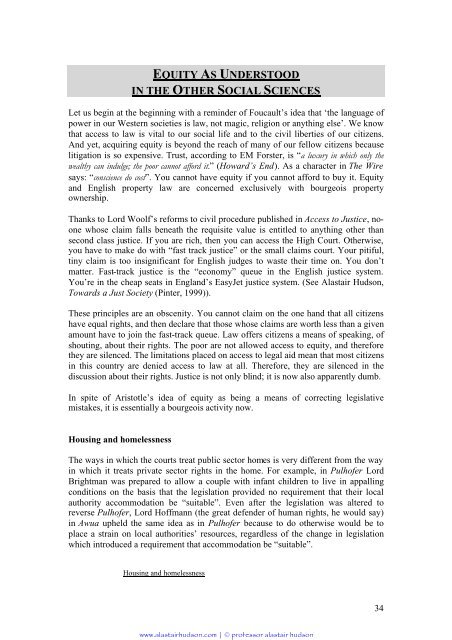England's dreaming equity, trust and conscience - alastairhudson.com
England's dreaming equity, trust and conscience - alastairhudson.com
England's dreaming equity, trust and conscience - alastairhudson.com
Create successful ePaper yourself
Turn your PDF publications into a flip-book with our unique Google optimized e-Paper software.
EQUITY AS UNDERSTOODIN THE OTHER SOCIAL SCIENCESLet us begin at the beginning with a reminder of Foucault’s idea that ‘the language ofpower in our Western societies is law, not magic, religion or anything else’. We knowthat access to law is vital to our social life <strong>and</strong> to the civil liberties of our citizens.And yet, acquiring <strong>equity</strong> is beyond the reach of many of our fellow citizens becauselitigation is so expensive. Trust, according to EM Forster, is “a luxury in which only thewealthy can indulge; the poor cannot afford it.” (Howard’s End). As a character in The Wiresays: “<strong>conscience</strong> do cost”. You cannot have <strong>equity</strong> if you cannot afford to buy it. Equity<strong>and</strong> English property law are concerned exclusively with bourgeois propertyownership.Thanks to Lord Woolf’s reforms to civil procedure published in Access to Justice, noonewhose claim falls beneath the requisite value is entitled to anything other thansecond class justice. If you are rich, then you can access the High Court. Otherwise,you have to make do with “fast track justice” or the small claims court. Your pitiful,tiny claim is too insignificant for English judges to waste their time on. You don’tmatter. Fast-track justice is the “economy” queue in the English justice system.You’re in the cheap seats in Engl<strong>and</strong>’s EasyJet justice system. (See Alastair Hudson,Towards a Just Society (Pinter, 1999)).These principles are an obscenity. You cannot claim on the one h<strong>and</strong> that all citizenshave equal rights, <strong>and</strong> then declare that those whose claims are worth less than a givenamount have to join the fast-track queue. Law offers citizens a means of speaking, ofshouting, about their rights. The poor are not allowed access to <strong>equity</strong>, <strong>and</strong> thereforethey are silenced. The limitations placed on access to legal aid mean that most citizensin this country are denied access to law at all. Therefore, they are silenced in thediscussion about their rights. Justice is not only blind; it is now also apparently dumb.In spite of Aristotle’s idea of <strong>equity</strong> as being a means of correcting legislativemistakes, it is essentially a bourgeois activity now.Housing <strong>and</strong> homelessnessThe ways in which the courts treat public sector homes is very different from the wayin which it treats private sector rights in the home. For example, in Pulhofer LordBrightman was prepared to allow a couple with infant children to live in appallingconditions on the basis that the legislation provided no requirement that their localauthority ac<strong>com</strong>modation be “suitable”. Even after the legislation was altered toreverse Pulhofer, Lord Hoffmann (the great defender of human rights, he would say)in Awua upheld the same idea as in Pulhofer because to do otherwise would be toplace a strain on local authorities’ resources, regardless of the change in legislationwhich introduced a requirement that ac<strong>com</strong>modation be “suitable”.Housing <strong>and</strong> homelessness34www.<strong>alastairhudson</strong>.<strong>com</strong> | © professor alastair hudson













